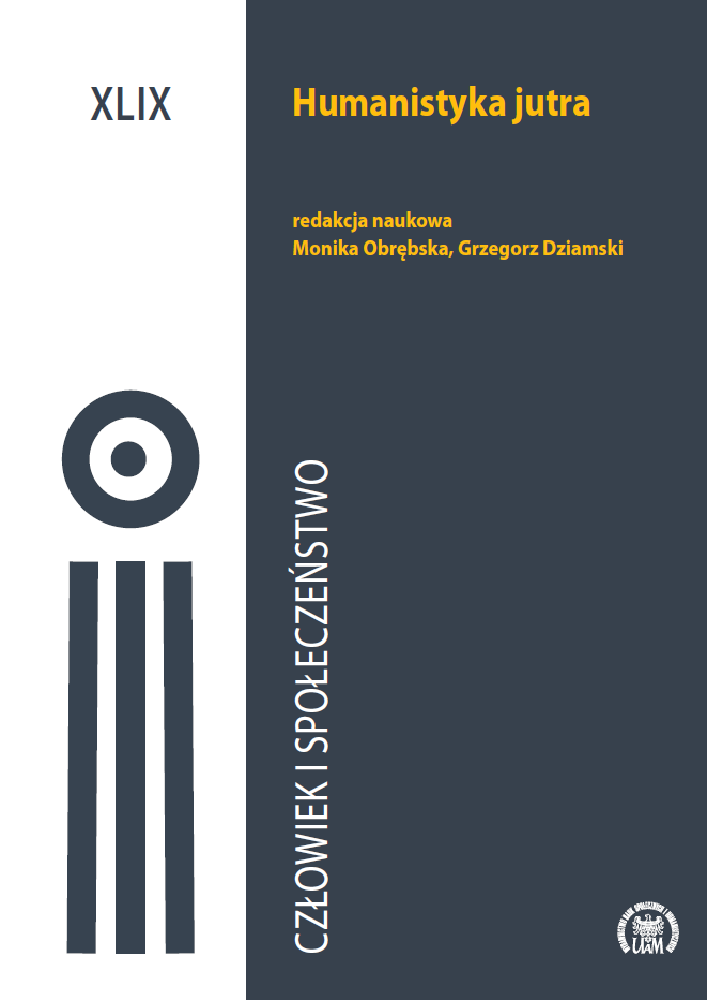Abstract
The purpose of this paper is to ponder upon the future of the humanities from a metaphilosophical perspective inspired by G.W.F. Hegel’s philosophy of the history of philosophy. The need for this reflection follows from the crisis that the humanities are facing today due to global changes in higher education, caused by the domination of the capitalist economy and the dramatic development of technology. The author assumes that the essence of the humanities is determined by the formation of self-understanding (Bildung) and proposes to consider this issue from a broader historical point of view and apart from the institutional context of human sciences, namely in the light of the history of philosophy, understood according to the Hegelian approach as the development of selfknowledge. The paper extensively discusses Hegel’s philosophy of the history of philosophy, as well as subsequent metaphilosophical positions inspired by Hegel’s thought (especially that of August Cieszkowski and Martin Heidegger). As a result, the question about the future of the humanities is transformed into a postulate of reflection on the primacy of technoscientific thinking in the modern world. In line with the Hegelian view of knowledge development – attributing autoperformative function to self-cognition – this kind of reflection is a potential remedy for the crisis currently diagnosed in the humanities.
References
Bauman, Z., Donskis, L. (2013). Moral Blindness. The Loss of Sensitivity in Liquid Modernity. Cambridge: Polity
Biesta, G. (2002). Bildung and modernity: The future of bildung in a world of difference. Studies in Philosophy and Education, 21, 343–351. DOI: https:// doi.org/10.1023/A:1019874106870.
Cieszkowski, A. (1972). Prolegomena do historiozofii, Bóg i palingeneza oraz mniejsze pisma filozoficzne z lat 1838–1842. Warszawa: Państwowe Wydawnictwo Naukowe.
Hegel, G.W.F. (1964). Wykłady o estetyce, t. 1, tłum. J. Grabowski, A. Landman. Warszawa: Państwowe Wydawnictwo Naukowe.
Hegel, G.W.F. (1969). Zasady filozofii prawa, tłum. A. Landman. Warszawa: Państwowe Wydawnictwo Naukowe.
Hegel, G.W.F. (1994). Wykłady z historii filozofii, t. 1, tłum. Ś.F. Nowicki. Warszawa: Państwowe Wydawnictwo Naukowe.
Hegel, G.W.F. (1996). Wykłady z historii filozofii, t. 2, tłum. Ś.F. Nowicki. Warszawa: Państwowe Wydawnictwo Naukowe.
Hegel, G.W.F. (2002). Wykłady z historii filozofii, t. 3, tłum. Ś.F. Nowicki. Warszawa: Wydawnictwo Naukowe PWN.
Heidegger, M. (1977). Budować, mieszkać, myśleć. Eseje wybrane, tłum. K. Michalski, K. Pomian, M.J. Siemek, J. Tischner, K. Wolicki. Warszawa: Czytelnik.
Heidegger, M. (1997). Drogi lasu, tłum. J. Gierasimiuk, R. Marszałek, J. Mizera, J. Sidorek, K. Wolicki. Warszawa: Fundacja Aletheia.
Heidegger, M. (1999). Ku rzeczy myślenia, tłum. K. Michalski, J. Mizera, C. Wodziński. Warszawa: Fundacja Aletheia.
Husserl, E. (1999). Kryzys nauk europejskich i fenomenologia transcendentalna, tłum. S. Walczewska. Toruń: Rolewski.
Jaeschke, W. (1995). Die Geschichtlichkeit der Geschichte. Hegel-Jahrbuch, 1995, 363–373.
Januszkiewicz, M. (2009). Czy mamy dziś kryzys humanistyki? Znak, 653. http:// www.miesiecznik.znak.com.pl/6532009michal-januszkiewiczczy-mamy-dzis-kryzys-humanistyki, dostęp: 28.09.2020.
Krajewska, A. (2012). Przemiany misji i funkcji uniwersytetu. Studia Ecologiae et Bioethicae UKSW, 10, 89–107.
Kwiek, M. (2010). Transformacje uniwersytetu. Zmiany instytucjonalne i ewolucje polityki edukacyjnej w Europie. Poznań: Wydawnictwo Naukowe UAM.
Leško, V. (2017). Filozofia dziejów filozofii. Silne i słabe modele, tłum. B. Szubert, D. Bęben. Katowice: Wydawnictwo Uniwersytetu Śląskiego.
Löwith, K. (2001). Od Hegla do Nietzschego. Rewolucyjny przełom w myśli XIX wieku, tłum. S. Gromadzki. Warszawa: KR.
Marks, K. (1966). Różnice między demokrytejską a epikurejską filozofią przyrody, tłum. I. Krońska. Warszawa: Książka i Wiedza.
Marks, K. (1981). Dzieła wybrane, t. 1, tłum. L. Kołakowski, K. Błeszyński. Warszawa: Książka i Wiedza.
Nowak, L. (1998). Byt i myśl, t. 1. Poznań: Zysk i S-ka.
Nuzzo, A. (2003). Hegel’s method for a history of philosophy: The Berlin introductions to the lectures on the history of philosophy (1819–1831). W: D.A. Duquette (red.), Hegel’s History of Philosophy. New Interpretations (s. 19–34). New York: State University of New York Press.
Renthe-Fink, L. (1964). Geschichtlichkeit. Ihr terminologischer und begrifflicher Ursprung bei Hegel, Haym, Dilthey und Yorck. Göttingen: Vandenhoeck & Ruprecht.
Sauerland, K. (2008). Idea uniwersytetu: aktualność tradycji Humboldta? Przegląd pedagogiczny, 1, 29–37.
Vattimo, G. (2011). Poza interpretacją. Znaczenie hermeneutyki dla filozofii, tłum. K. Kasia. Kraków: Universitas.
Woźniczka, M. (red.), (2011). Metafilozofia – nieporozumienie czy szansa filozofii? Kraków: Scriptum.
License
1. W momencie złożenia pracy celem rozpoczęcia postępowania w sprawie publikacji, Licencjodawca, zwany dalej Autorem, akceptuje wszystkie zasady umieszczone na stronie internetowej czasopisma “Człowiek i Społeczeństwo”, udzielając Licencjobiorcy, zwanego dalej Wydawcą, niewyłącznej i nieodpłatnej licencji na korzystanie z Utworu. Licencja zakłada tym samym brak ograniczeń terytorialnych, czasowych oraz ilościowych na następujących polach eksploatacji (art. 50 ustawy z dnia 4 lutego 1994 r. o prawie autorskim i prawach pokrewnych):
a. utrwalanie Utworu;
b. zwielokrotnienie Utworu drukiem i w wersji cyfrowej;
c. wprowadzenie do obrotu, użyczenie lub najem oryginału/zwielokrotnionych egzemplarzy Utworu;
d. publiczne wykonanie, wystawienie, wyświetlenie, odtworzenie oraz nadawanie i reemitowanie, a także publiczne udostępnianie Utworu w taki sposób, aby każdy mógł mieć do niego dostęp w miejscu i w czasie przez siebie wybranym;
e. włączenie Utworu w skład utworu zbiorowego;
f. wprowadzenie Utworu w postaci elektronicznej na platformy elektroniczne lub inne wprowadzenie Utworu w postaci elektronicznej do Internetu, Intranetu, Extranetu lub innej sieci;
g. rozpowszechnianie Utworu w wersji elektronicznej w Internecie, Intranecie, Extranecie lub innej sieci, w pracy zbiorowej, a także samodzielnie w formule Open Access w oparciu o licencję Creative Commons Uznanie autorstwa 4.0 Międzynarodowa Licencja Publiczna (CC BY 4.0), a także inną wersję językową tej licencji, lub którąkolwiek późniejszą wersję tej licencji.
2. Założenia licencji Creative Commons Uznanie autorstwa 4.0 Międzynarodowa Licencja Publiczna (CC BY 4.0), udzielają Wydawcy upoważnienia do kopiowania, zmieniania, rozprowadzania, przedstawiania i wykonywania Utworu jedynie pod warunkiem uznania autorstwa.
3. Wraz z dostarczeniem Utworu, Autor zobowiązuje się do wypełnienia, podpisania oraz odesłania skanu umowy
